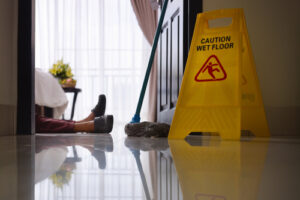Posted in Blog
Premises Liability Lawyer

Duty of Care
Premises liability cases revolve around the concept of “duty of care.” Property owners and occupiers have a legal obligation to maintain their premises in a reasonably safe condition and to warn visitors of any known hazards. The level of duty owed varies depending on the visitor’s status—whether they are an invitee, licensee, or trespasser. Invitees, such as customers or guests, receive the highest level of protection, while trespassers are afforded limited protection. Understanding the duty of care owed to you based on your visitor status is crucial in premises liability cases.
Types of Hazards
Premises liability cases can arise from various types of hazards present on someone else’s property. These hazards can include:
- Slippery or wet surfaces
- Uneven or broken walkways
- Inadequate lighting
- Falling objects or debris
- Hazardous conditions in swimming pools or recreational areas
- Insufficient security leading to assaults or attacks
Identifying the specific hazard that caused your injury is vital in establishing liability and seeking compensation in premises liability cases.
Notice and Foreseeability
To establish liability in a premises liability case, it is crucial to demonstrate that the property owner or occupier knew or should have known about the hazardous condition. This concept is known as “notice” or “foreseeability.” Actual notice occurs when the property owner is aware of the hazard, while constructive notice implies that the hazard existed for a sufficient period that the owner should have known about it. Gathering evidence to establish notice or foreseeability is essential in premises liability cases.
Comparative Negligence
Premises liability cases may involve the principle of comparative negligence, which assigns degrees of fault to both the injured party and the property owner. If it is determined that the injured party shares some responsibility for their injuries due to their own negligence, the compensation awarded may be reduced accordingly. Understanding the concept of comparative negligence is crucial, as it can affect the amount of compensation you may receive in a premises liability case.
Importance of Evidence
Strong evidence is crucial in premises liability cases to establish liability and support your claim for compensation. It is essential to document the hazardous condition that caused your injury through photographs, witness statements, incident reports, and any other relevant documentation. Additionally, medical records, bills, and expert opinions may be necessary to prove the extent of your injuries and associated damages. Collecting and preserving evidence as soon as possible after the incident is vital in premises liability cases.
